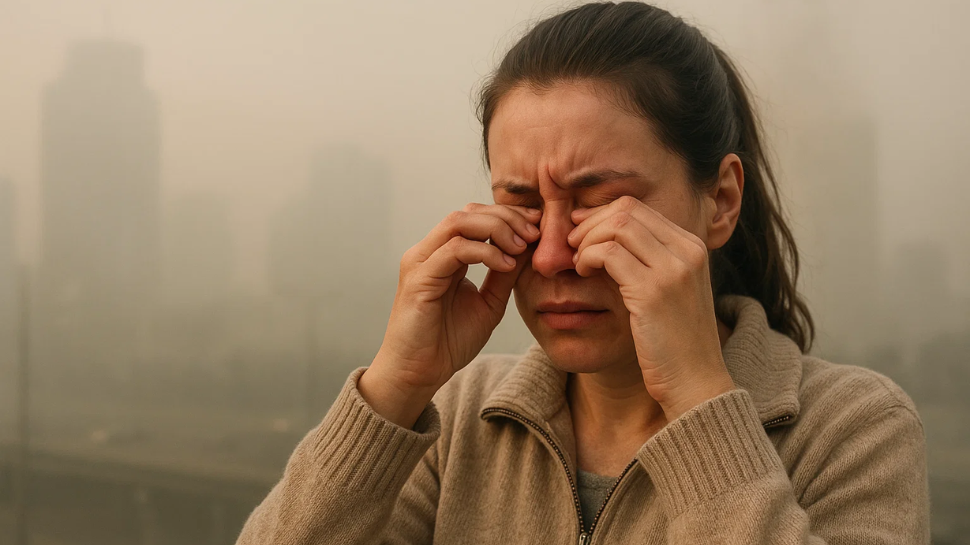Air Pollution and its effect on Eye Health: As air quality deteriorates in the post-Diwali period, ophthalmologists are seeing a surge in eye-related complaints linked to ambient pollution. Fine particulates (PM 2.5) and gaseous pollutants, such as nitrogen dioxide (NO₂) and ozone (O₃), act on the ocular surface, triggering tear-film instability, oxidative stress, and inflammation.
Dr Sunil Morekar, MBBS, MS, Ophthalmology, Ophthalmologist, Eye Surgeon, Lilavati Hospital, Mumbai, says, “Clinically, patients may present with symptoms of dry-eye disease (DED), burning, gritty sensation, photophobia, and intermittent blurring. Pollutants reduce production of the mucin and lipid layers of the tear film, increasing evaporation and exposing the corneal epithelium to damage.”
Exposure may also aggravate allergic conjunctivitis, with redness, tearing, and itch due to conjunctival inflammation from airborne irritants.
Dr Morekar says, “Beyond surface symptoms, longer-term exposure is now being linked to more serious ophthalmic conditions: there is emerging evidence of increased risk of cataract formation (via oxidative stress in the lens), and even of retinal and optic-nerve damage, for example, higher incidence of Age‑related Macular Degeneration (AMD) and Glaucoma in heavy-pollution zones.”
How to Protect Your Eyes, Especially Post-Diwali
– Monitor the Air Quality Index (AQI) and minimise outdoor exposure when PM 2.5 > 100 µg/m³ or AQI is “very poor.”
– Wear wrap-around sunglasses or protective eyewear when outside: this reduces windborne particulate contact with the eye.
– Use preservative-free lubricating drops (artificial tears) to stabilise the tear film and relieve irritation.
– Maintain indoor air quality: use an air purifier if possible: keep windows closed when outdoor air is heavy, and avoid burning incense or fire-crackers in enclosed spaces.
– Ensure a diet rich in antioxidants (vitamins A, C, E, omega-3 fatty acids): oxidative stress is the underlying mechanism by which pollution damages ocular tissues.
– Regular eye-checkups: If you experience persistent redness, light-sensitivity, blurred vision or new floaters, consult an ophthalmologist early.
The eyes are a direct interface with the environment and pollution is no longer just a respiratory concern, it is increasingly a vision-health threat. Taking simple protective steps now can preserve comfort and ocular health long-term.
Dr Mandeep Singh Basu, Director, Dr Basu Eye Care Centre, says, “Every year after Diwali, as pollution levels rise, we see a noticeable increase in people experiencing redness, dryness, and irritation in the eyes. The fine dust and smoke particles in the air can disturb the natural tear film, making the eyes feel gritty and uncomfortable. Those who already have dry eyes, wear contact lenses, or spend long hours on screens are usually affected more severely.”
“A few simple habits can make a big difference. Using soothing lubricating drops such as Isotine Eye Drops helps relieve dryness and keeps the eyes refreshed. It’s also advisable to rinse your eyes with clean water after being outdoors, wear protective glasses when pollution levels are high, and stay hydrated to support natural tear production,” he further reveals.
Our eyes are one of the most sensitive parts of the body and deserve mindful care. With small, consistent steps, we can protect them from post-Diwali pollution and keep them clear, comfortable, and healthy.
Dr Shubhnav Jain, Consultant, Ophthalmology, CK Birla Hospitals, Jaipur, says, “Air pollution is a complex mix of gases, particulate matter, and chemical compounds that can infiltrate the eyes.”
Symptoms of Air Pollution on Your Eyes
Dr Shubhnav says, “If you have ever experienced any of the following symptoms, it could be the visible signs of the effects of air pollution.” Look out for the following symptoms:
1. Itchy and Red Eyes
Irritation and inflammation caused by pollutants can result in itchy, red eyes. This discomfort can be mild or severe, depending on the level of pollution.
2. Watery Eyes
Smog can exacerbate eye allergies, making your eyes watery and uncomfortable.
3. Dry Eyes
Prolonged exposure to pollutants can lead to chronic dry eye syndrome. Smog effects are observed when your eyes don’t produce enough tears or produce poor-quality tears to keep your eyes lubricated. Dry eyes can be painful and even impair your vision.
4. Blurry Vision
Allergic reactions to airborne allergens in polluted air can result in blurry vision.
Ways to Safeguard Your Vision
1. Wear Sunglasses
Invest in high-quality sunglasses with UV protection to protect your eyes from UV rays & block out some of the airborne particles.
2. Limit Outdoor Activities
Try to minimise your time outdoors, especially during peak pollution hours. It can be a safe solution to protect eyes from air pollution.
3. Air Filters and Purifiers
Improve indoor air quality using air purifiers & filters in your home. These devices can significantly reduce your exposure to indoor air pollution.
4. Maintain a Healthy Lifestyle
A diet rich in antioxidants, regular exercise, and avoiding smoking can help alleviate your risk of eye diseases associated with smog.
5. Regular Eye Examination
Schedule routine eye examination with an ophthalmologist to monitor your eye health and detect any issues early. Eye specialists can provide you with the right air pollution solutions on how to protect your eyes.
6. Eye Drops for Dust Removal
Eye drops can provide much-needed relief and protection against the adverse effects of air pollution. Doctors may recommend antihistamines or lubricating eye drops to alleviate the effects of air pollution. It is best to consult eye specialists than using eye drops yourself.
(This article is meant for informational purposes only and must not be considered a substitute for advice provided by qualified medical professionals. Always seek the advice of your doctor with any questions about a medical condition.)


)